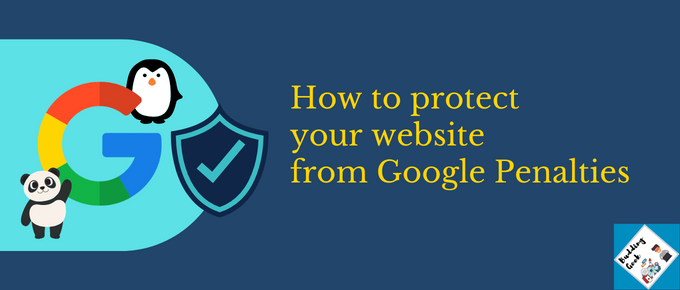As a website owner and marketer, regularly keeping yourself up-to-date with various Google’s algorithm updates is very important these days. I started my blogging career 13 years ago and since then I’ve witnessed a number of algo updates affecting my websites in some or the other ways. One of the most significant updates was the Google Penguin algorithm update, which almost crashed my website’s traffic overnight. How can I forget April 24, 2012? That was when it first rolled out. I did not engage in any manipulative or black-hat SEO practice. I just did what was considered white-hat at that time. And then, Google changed the rules of its game. Pheww…but I eventually recovered my traffic and overturned that Penguin.
In this post today, I will share my learnings with you, and will discuss how you can also avoid being hit by a Google algorithmic update. And… If you’ve been hit, you can try these tips to help yourself recover from its negative effects on your site.
What was Google Penguin Update? And what websites did it specifically target?
The Google Penguin update was a Google search algorithm update that was first rolled out on April 24, 2012 as a targeted attack on spammy and manipulative link-building practices used by websites to boost their search engine rankings. Ever since then, Google Penguin update has been rolled out 7 times, with the latest on September 23, 2016. It’s however now a real-time update that devaluates web-pages based on link spam signals.
What I did before 2012 to optimize my websites for better search results?
I did a number of things for my website that were considered natural at that time. Such as:
- Adding my website to various web directories
- Article submissions to various directories to build backlinks
- Dropping comments with links to my blog posts
- Asking fellow webmasters to link to my site and in return I offered to link to their websites (reciprocal links)
If you observe closely, you will agree that all the above-mentioned efforts were forcefully manual in a desperate bid to acquire more and more backlinks. A blogger’s time should have been utilized in building great and compelling content for his blog. Isn’t it?
My Learnings…
The web and the SEO world have evolved a lot since 2012. And…What I learnt is that we eventually have to comply with Google’s search quality rater guidelines (bookmark it!) in order to do well in search results. Updates like Penguin and Panda will keep on coming. If we continue to create awesome websites with all our heart to help the people, then these algo updates should be any cause of concern.
With that being said, it’s also important to note that building your online business solely around just one traffic source like Google is very risky. Depending solely on Google search traffic for your website means that you’re putting all your eggs in one basket. If something goes wrong with your SEO strategy, or if Google changes its policies and rules, your website’s traffic can literally vanish overnight. Therefore, always try to diversify your traffic channels.
5 tips / rules to avoid being hit by a Google algorithmic update in 2023
1. Monitor your backlink profile regularly
While Google still considers backlinks as a key factor in evaluating a website’s quality, it’s important to note that not all backlinks are created equal. Whether you build backlinks yourself, or acquire them naturally, it’s important to regularly monitor your backlink profile and remove or disavow any spammy or low-quality links as it could potentially harm your search rankings.
Avoid these types of link building campaigns:
Directory / article submission – Abstain from building backlinks with random web and article directories. You can’t control what types of links these editors are approving in the category you have applied for. The presence of even a single spammy/malicious link in your category can seriously damage your website’s reputation.
So, it’s better to stay away from link directories than to risk your website’s reputation just for the sake of an easy backlink. The only exceptions are top renowned directories including DMOZ and Yahoo! web directory. But unfortunately, their approval rates are almost negligible!
Concluding it, I strongly believe that directory submission is a huge waste of time and it can negatively impact your backlink profile.
Reciprocal Links – This is perhaps the easiest way to build quick backlinks. The approach is – “you link to my site and I will link to your site”
Paid links – Some webmasters find it easy to obtain a link of their own desired anchor text in exchange for a few bucks. While this seems to be a win-win situation but the truth is that this type of link building can invite heavy penalties from Google. Remember how Google penalized its own Chrome web browser for paid links?
Healthy and safe approach to build backlinks:
Guest Post – It is the most powerful method of building high quality backlinks to your website. Not only do you earn a great backlink but this also does improve your relations with fellow influencers / bloggers in your niche.
Again remember: You should only consider making guest posts on popular and authoritative blogs in your niche and NOT random and low-quality blogs outside your niche!
Write great content – If you are writing useful and interesting content on your blog then your blog will have the ability to attract backlinks naturally. Don’t worry about building backlinks…just write great content right from your heart!
Don’t neglect your outbound link profile…
A strict moderation on all your outbound links is equally important as inbound links.
Never ever link to any suspicious/questionable link from your blog post. As a matter of fact, bloggers accepting guest posts are most vulnerable to outbound link quality. Evaluate each outbound link as well as its anchor text for its naturality.
2. Focus on creating high-quality and valuable content
Google’s top priority is to provide users with the most relevant and useful content for their search queries. When you focus on creating high-quality, valuable content that meets the needs of your target audience, you can improve your chances of ranking well in search results. Here are a few blog posts that you must read to learn how to create high quality content for your blog / website:
3. Follow Google’s Search Essentials guidelines closely
Google regularly updates its search quality guidelines — Now known as Search Essentials, which outline the best practices that webmasters should follow while creating websites that are easy to crawl and index. If you diligently follow these guidelines, you can significantly reduce your risk of being penalised by any future algorithmic update by Google.
How to keep track of the Search Essentials Updates?
There are several ways to keep yourself up-to-date with these updates. Here is what I suggest:
- Bookmark the Search Essentials Page
- Follow Google Search Central on twitter. Enable notifications for their tweets!
4. Keep your website up-to-date
It’s important to ensure that your website always stays up-to-date, not only in terms of fresh content, but also in terms of adopting the latest technologies and the best web practices. Search engines love fresh and updated content, so that users can be offered the most relevant and useful information.
Keeping an updated website can help improve your website’s user experience and can also reduce the risk of adversely impacting your search engine rankings.
5. Focus on improving the user-experience
Why improve the user experience? Because that’s what Google wants its users to experience when they click on any website on its search results. You can improve the user experience of your website by:
- Improving your site’s page load speed
- Adopting a site architecture that’s easy for users to navigate and find relevant information
- Being conservative with the use of pop-ups and advertisements
- Adopting a responsive layout that looks great on any screen size
How do you prepare your site for Google algorithm updates?
What tips do you follow to shield your website from being hit by Google’s algorithm updates? What do you do to stay ahead of the game? Please share your thoughts in the comments below.

